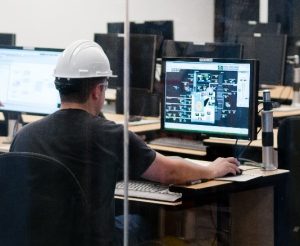
As classes transitioned primarily online in an effort to limit the spread of COVID-19, BCIT Power Engineering students Cholo Belza, Brandon Chiang, Lucas Knott, Byron Tromp, and Joseph Vizjak took the initiative to pilot a cloud-based power plant simulator. This ensured they, along with their peers, were still able to acquire the practical skills relevant to their training even in an online learning environment.
The sophisticated power plant simulator, developed in collaboration between BCIT and industry partner Kongsberg, has always been used in the classroom by Power Engineering students. Since classes transitioned primarily online as a result of COVID-19, the five Power Engineering students worked to develop their own expertise before subsequently championing the other students in teams. Each team ran a simulation of a large thermal power plant that was based in the cloud. The simulator is essentially identical to the one used in the classroom during pre-COVID-19 times. The students were successful in remotely operating and troubleshooting the simulated plant, gaining valuable experience and knowledge in the process. In addition, these students successfully completed assignments and examinations on a range of simulated processes and satisfied qualifying time requirements set by Technical Safety BC (TSBC).
Applied learning for the real world
Cholo, Brandon, Lucas, Byron, and Joseph not only took the knowledge they learned and supported their peers during remote learning, they also gained skills for the real world.. Lucas shared, “As we advance through our careers, we will be responsible for the safe operation of facilities very similar to the one in the simulator, but with real consequences. If we can master the simulator with its near identical procedures and pieces as the real facility in Sweden, then we will more than qualify for operating in the industry.”
A similar sentiment was echoed by Brandon, “Aside from gaining valuable and relevant experience with troubleshooting and operating cloud-based power plant simulations and satisfying the steam time required by TSBC, I am honored to be involved with the experimental phase of a piece of next-generation software technology that pertains to my field of study.” Bryon added, “This prepared us for future challenges that may suddenly arise much like the scenario we were put in during the COVD-19 pandemic.”
While Joseph shared that some of the challenges with the project included spotty internet connections and a large update to the simulator system midway through the program, Cholo explained, “One of the advantages of having this cloud-based simulation was its convenience to run from your own personal computer. The recent turn of events due to the COVID-19 pandemic certainly brought huge disturbance to everyone’s life and for a moment, it seemed impossible to finish this course because of its classroom-based nature. However, technology really made its way and helped us complete our activities. Though the access is limited [to] only five selected students, we were able to share our simulation through screen sharing and I am proud that the rest of the class stepped up to participate with the troubleshooting part of the simulation like we were in a real power plant situation, finding faults, sharing ideas, then creating and agreeing to solution together.”
“The five students and their instructor embraced the challenge. In doing so, they not only gained valuable experience but also created a pathway for future students and opened opportunities for remote area training. Our department is better for their efforts and proud of all of them,” said Mike Safoniuk, Chief Instructor.
Kongsberg is an international technology group that supplies high-technology systems and solutions to customers in the merchant marine, defense, aerospace, offshore oil and gas industries, and renewable and utilities industries. They are a provider of next generation software and digital solutions to customers within maritime, oil and gas, and utilities. Kongsberg Digital offers solutions within autonomy, smart data, augmented reality and other areas.
SEE MORE: BCIT Automotive students prepared for success in the post-COVID-19 workforce
